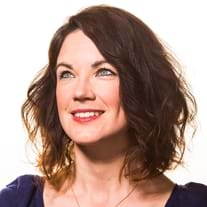The Crucial Need for Ethics in Space Exploration
Dr. Lucianne Walkowicz is determining the ethics of exploring Mars.
Published January 19, 2018


While generations of stargazers have dreamt of the fantastic possibilities inherent in space exploration and colonization, few have concerned themselves with the ethics of such endeavors.
Lucianne Walkowicz, PhD, astronomer at the Adler Planetarium and Baruch S. Blumberg NASA/Library of Congress Chair in Astrobiology in the John W. Kluge Center at the Library of Congress, is devoting this year to generating an ethical framework for interplanetary exploration. During her residency at the Library of Congress, her project, titled “Fear of a Green Planet: Inclusive Systems of Thought for Human Exploration of Mars,” will call upon lessons from human colonization on Earth as a foundation for our expeditions into space.
Dr. Walkowicz is adamant that space exploration has much to learn from the spread of humanity. Past mistakes should not be repeated.
“When we look at how we’ve explored this planet and, for example, our treatment of either indigenous people or indigenous species in places that we have explored, we haven’t exactly been exemplars in our treatment of those people or species. That’s resulted in damage to our relationships in new lands, and also to the lands themselves.”
Without current evidence for life on Mars, some view it as open territory, and therefore unencumbered by these considerations. Dr. Walkowicz disagrees, and advocates for the protection of Mars’ environment, living or not.
“In Mars’ case, we know that it used to be a habitable planet in the past, and that doesn’t mean that it had life, but it certainly means that there could’ve been a history of life there, and it is an environment that is sovereign in and of itself,” she said. “I think we can look at some of the behaviors that we have engaged in on Earth, and some of the choices we’ve made in the past that have, for example, compromised the environment, and ask ourselves how we can do that differently on Mars?”
Preserving Other Planets
We can start by ensuring that environments like Mars remain intact, and Dr. Walkowicz clarified who exactly is the “we” in this context, “This is complicated by the changing nature of exploration, which will no longer solely consist of nations, but companies within those nations.” Ensuring that both public and private interests are performing responsibly will be difficult to regulate.
As an example Dr. Walkowicz offered, “We have to determine how we might clean our spacecraft to explore Mars without contaminating it and extending that to not just organizations like NASA, but also private spaceflight companies that are engaging in their own activities on Mars … how do we protect Mars from ourselves?” She added, “If we want to send humans to Mars, then that’s an entirely different and more challenging problem than sending just spacecraft.”
The question of sending humans to other planets is so complex that Dr. Walkowicz believes it should not be left exclusively to members of the scientific community.
“That’s fine if what you’re talking about doing is science experiments on other worlds. But if actually what we are talking about is becoming humans that live on another world, we have to take into account that we have a human culture. And in order for us to think about how we might do that correctly, that requires us to think about how we choose our lives on Earth and what that might mean in its space iteration.” She finished, “Certainly, the history of Earth is full of a lot of mistakes and intentional actions that resulted in the massive inequality and some of the social problems we have today. If we want to live in space, how can we do that without necessarily reproducing a lot of the inequalities and injustices off Earth as well?”
Keeping the Public Engaged
The need for public input is a two-way street and Dr. Walkowicz wants scientists to keep the greater public engaged. Outside of the fact that the public has a right to know about the research they fund,.
“Science is a human undertaking in the same way that literature or art or music is a human undertaking. And I think we have a responsibility to share those scientific discoveries and the benefits that are created by them … People should be able to enjoy [these benefits] and it shouldn’t require being an actual scientist to do so. We certainly don’t tell people they can only enjoy music if they’re musicians. Science is a product of human activity that should be shared with all humanity.”
Whatever we find, and share, from our travels beyond Earth, Dr. Walkowicz sees planetary exploration as an opportunity to move beyond our relatively narrow breadth of experience.
“When we study astrobiology, I think one of the things we’re really limited by is that we only have one example of a planet that has life on it, so being able to study life in other environments is incredibly important scientifically, but can also help us understand what our greater relationship is to the universe,” she said.
